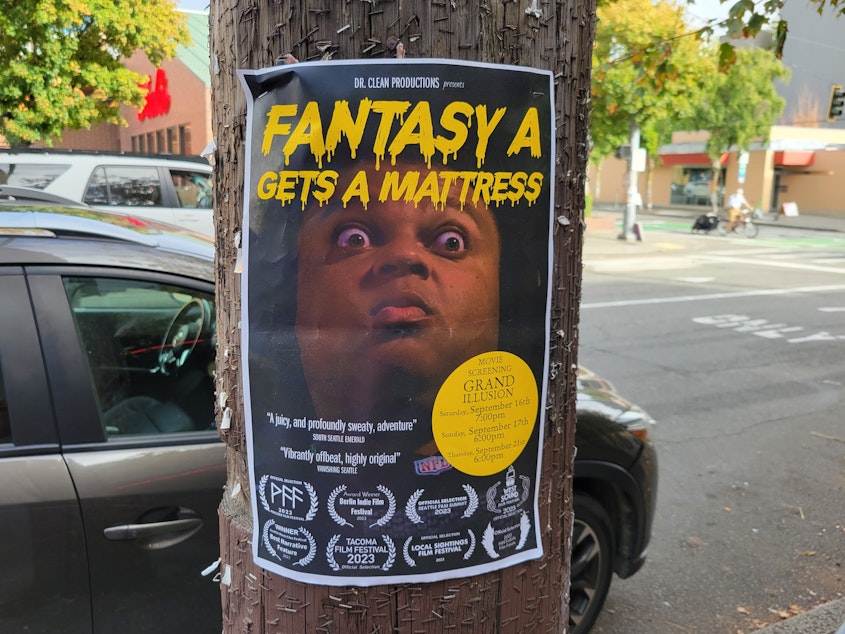'Fantasy A gets a Mattress': Local low-budget movie gains momentum in Seattle

"Fantasy A gets a Mattress" is taking Seattle by storm.
The movie, filmed in Seattle, won best narrative feature at the Seattle Black Film Festival back in April, and has sold out 20 screenings at the Beacon Cinema.
Now, it’s been chosen as an official selection at upcoming events including the Seattle Film Summit, Poulsbo Film Festival, Local Sighting Film Festival and Tacoma Film Festival.
In the movie "Fantasy A gets a Mattress," local rapper Fantasy A, who plays himself, faces evil landlords, dismissive locals, and the threat of homelessness.
The film paints an image of what it looks like to be an artist in Seattle.
It opens on the streets of Seattle. It flashes through familiar locations — the Smith Tower, a shutdown dry cleaner in Capitol Hill, signs in the Chinatown International District — as Fantasy A explains his dream of making it big, and how that dream was crushed.
Instead, Fantasy A has a new goal — getting a good night's sleep on a good mattress.
Noah Zoltan Sofian, who codirects the movie with David Norman Lewis, says that basic goal — getting a good night's sleep — speaks to the film's thesis.
Sponsored
"It's about increasingly lower expectations, which is why it's Fantasy A gets a mattress, not Fantasy A gets an apartment," he explains.
Fantasy A notes that, for him, the story is personal. In fact, it’s based on a line from one of his songs.
"It's from when I used to live in my old parent's house in the South Seattle area," he explains. "My dad suffered a stroke and my mom couldn't take care of herself. So that's the reason why I had to move out of there so I can start my life over again."
Creating the movie was a true labor of love, with no funding to speak of. What funding it did have, Zoltan Sofian says, came from occasional shifts at Dominos. He scouted for locations from his bike, looking for sites that matched the feel they were going for.
"A great way to pick a good location is if it has a proposal of land use notice on the front," he explains. "Because it means there's rust, cement, chipped paint, and rusted chain-link fences."
Sponsored
In a time when Seattle feels like ground zero for gentrification, that decision makes the film a time capsule. It feels like a memoriam to places that no longer exist.
It also, admittedly, makes for some weird sounding audio.
Both directors say the response to the movie has been a shock. Norman Lewis attributes part of the film's success to their decision not to put it up on streaming services.
"Putting stuff in theaters, you build up a following," he explains. "It has a mystique to it. It's a whole theater experience. And that really brings people out."
Parker Lautensleger, a film programmer at the Beacon Cinema in Columbia City, says it's more than just distribution that's made the film a success.
Sponsored
"They had a lot of engagement with the people coming," he explains. "Word of mouth spread about how fun it was — not just the film, but the experience surrounding it."
Lautensleger says that Fantasy A comes to every screening to greet moviegoers. They even brought a mattress for people to take pictures with.
And, during early screenings, they also rented goats, a joke based on Fantasy A being the GOAT, as in "Greatest Of All Time."
Lautensleger says the Beacon originally planned to air the movie just once, like they do most movies. But with such demand for the film, they ended up running the film for months.
But, even with all the success, co-directors David Norman Lewis and Noah Zoltan Sofian say the message of the movie remains — being an artist in Seattle is hard.
Sponsored
Fantasy A agrees. But he says he's not going anywhere.
"Seattle is will be always you be my home," he says. "I was born here and I will stay here until the day I die. And I will never go anywhere."
Correction notice, 1:59 p.m. on Monday, 09/18/23: A previous version of this story misattributed quotes from David Norman Lewis and Noah Zoltan Sofian to each other. This story has since been updated to reflect the correct attributions.






